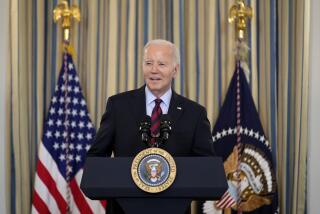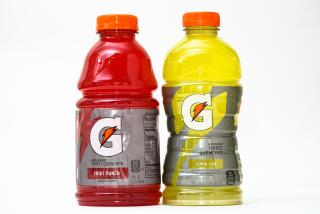Food firms say 6.4 trillion fewer calories sold in 2012 than in 2007
A group of big food companies sold 6.4 trillion fewer calories in the United States in 2012 than it did in 2007, an independent evaluator said Thursday in a report on the pledge manufacturers made to First Lady Michelle Obama’s program to end childhood obesity.
The news release from the Robert Wood Johnson Foundation, which funded the evaluation, is an early look at the effort -- which it said far exceeded the companies’ 2010 promise. The original pledge was to remove 1.5 trillion calories from the U.S. marketplace by 2015.
The 6.4-trillion-calorie decline translates to a reduction of 78 calories per person per day in the United States, the foundation said.
“It’s good news for both the companies that made these changes and for the American public,” said Dr. James Marks, senior vice president and director of the Health Group at the foundation.
“These companies are now better positioned than their competitors” to provide lower-calorie products, Marks said. The 16 participating companies include PepsiCo, Coca-Cola, Unilever, Kellogg and ConAgra Foods.
But what does it mean for consumers?
“The companies wanted to show they wanted to be part of the solution, not part of the problem,” Marks said. The CEO-led effort, called the Healthy Weight Commitment Foundation, “is not altruism. It is also being helpful to the companies themselves.”
The companies are responding to demand for products that are what the industry calls “better for you” – some lower-calorie, others repackaged in smaller portions, such as 100-calorie snack packs.
Marion Nestle, a nutrition professor at New York University, author and frequent critic of the food industry, called the reduction a step in the right direction, but she added that it’s important to see all the data and to learn how the changes are playing out in American homes.
Coca-Cola said it had introduced more than 100 no- and low-calorie beverages in the last seven years and had changed labeling and created smaller soda containers. It said in a statement Thursday that nearly a third of its beverages were now low- or no-calorie.
“We take seriously our commitment to help fight obesity. These efforts, and many others, are helping people make choices that let them lead happier, healthier lives,” the company said.
Rival Pepsi also issued a statement.
“Our industry has an important role to play in helping people lead healthy lives and our actions are having a positive impact,” said Indra Nooyi, chief executive of PepsiCo and chair of the Healthy Weight Commitment Foundation. “We see continued opportunities to give consumers the choices they’re looking for and to work collaboratively with the public and nonprofit sectors on initiatives that enable continued progress.”
The Grocery Manufactuers Assn. said in a statement that its members had “accelerated our efforts to provide consumers with the products, tools and information they need to achieve and maintain a healthy diet,” including more than 20,000 products introduced since 2002 with fewer calories, less fat, salt and sugar and more whole grains, as well as changes in labeling and advertising.
But critics say the work of the Healthy Weight Commitment Foundation also helps companies avoid regulation, and that calorie reductions don’t necessarily mean more healthful food.
The Healthy Weight Commitment Foundation hopes to distract attention “from what is really the food industry’s Achilles’ heel -- highly processed, minimally nutritious fare largely made up of inferior ingredients (refined flours, pro-inflammatory oils, controversial additives, etc.),” said Andy Bellatti, a registered dietitian.
People need to pay attention to the quality of their calories as well as the total, he said. “A 100-calorie pack of Cheetos, after all, is not a better choice than a 130-calorie apple.”
Marks agreed that the accomplishment is not a solution.
“It does not mean that they have done away with high-calorie products or with large packages, but they started to shift the mix,” he said.
NYU’s Nestle noted that the country’s obesity epidemic resulted from about a 300-calorie-a-day increase across the adult population, and it’s estimated it will take about the same to reverse it. “If that’s the case, 78 calories is a step in that direction,” she said.
The changes are early and fragile, Marks said, but there are positive signs that the obesity epidemic is slowing. No one thing caused it, he said -- citing reductions in gym class, larger soda sizes and lack of sidewalks -- and no one thing will cure it.
Researchers at the University of North Carolina are evaluating the impact of the companies’ pledge using sales data from the firms and nutrition data. The Robert Wood Johnson Foundation is expected to publish its full report later this year.
mary.macvean@latimes.com







